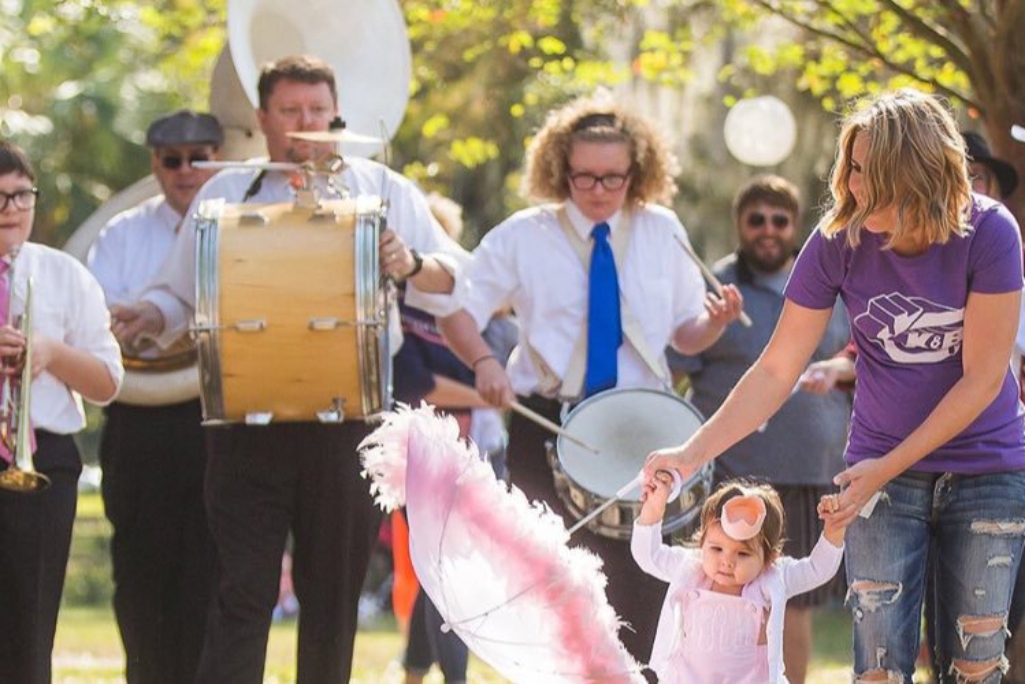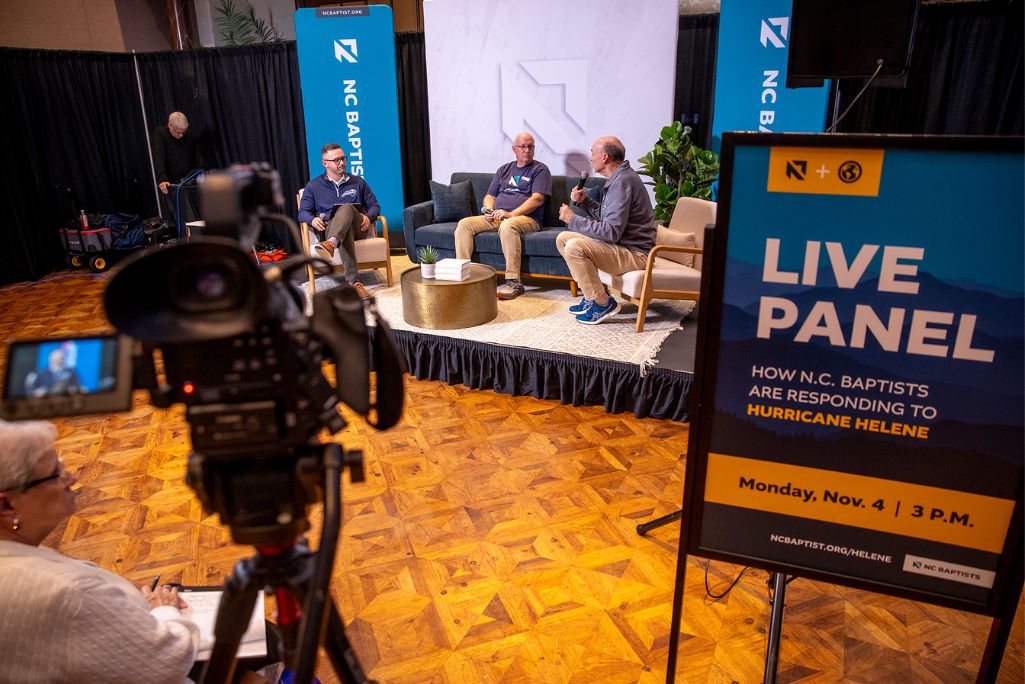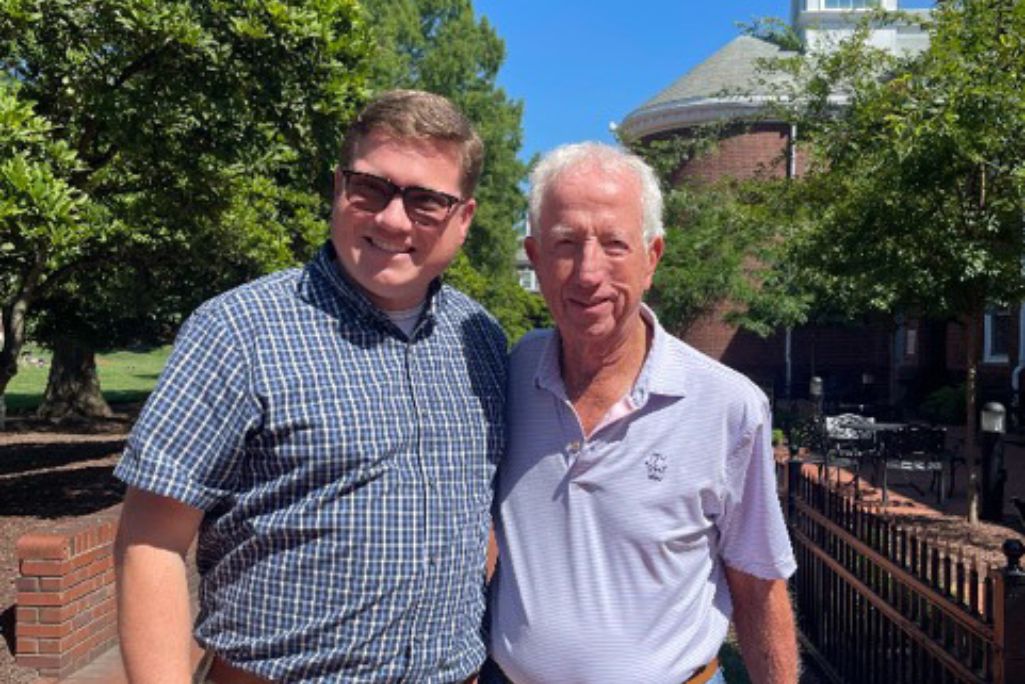
Jay Adkins (center) and his sons are members of the CanonFodder Brass Band.
NEW ORLEANS (BP) – If you’re on neutral ground in New Orleans, it has nothing to do with nonpartisanship, but it’s that grassy middle area between roads – otherwise known as a median.
And that messenger from Saint Mary Parish? Yes, they’re Southern Baptist, too. Parish is what Louisianans call a county.
A culture unique to the rest of the South awaits the more than 11,000 messengers headed to the 2023 Southern Baptist Convention Annual Meeting in New Orleans. Mardi Gras and Jazz Fest will have come and gone, but the spicy gumbo of food, eclectic music, neighborhood parades and second-lines – impromptu musical processions because why not – are nearly seasonless.
Southern Baptists have built a favorable relationship in the city, many pastors say, fueled by the Southern Baptist New Orleans Baptist Theological Seminary, its outreach, and Southern Baptists nationwide who helped homeowners and churches rebuild after Hurricane Katrina, not charging a dime.
Jay Adkins, lead pastor of First Baptist Church of Westwego, a New Orleans suburb, expresses a love for the area. As chair of the Local Encouragement Team – that’s New Orleans for Arrangements Team – Adkins has compiled a series of lists that encourage an extended stay in New Orleans before and after the business is done.
He describes the city as a wonderful place that is yet heartbroken and needs Jesus.
“I’m not saying to come here and expose yourselves to the sinful parts of the town,” he said. “There’s a bit of a lack of shame in the sinful activities here. That’s very clear. Everybody knows that. It’s not that I want people to see it; I want them to know that it’s there. So that then they pray for us in this place. Because it’s hard to do ministry here.”
Messengers will find evangelism challenging in the Big Easy, as New Orleans is known.
“This is a very post-modern place. It’s become a place of ideas of everybody has ‘their truth. You can live your life the way you want to,’” Adkins said. “And most folks don’t bother you about that. As they say here, ‘Laissez les Bons Temps Rouler.’ Let the good times roll. So you do your thing, I’ll do my thing, and we’ll just get along.”
On one hand, New Orleans “is a wonderfully celebratory, fun place to live,” where everybody’s invited to the party, Adkins said. “And yet at the same time, to then present the Gospel, it can be difficult, because intrinsic in the message of the Gospel is an exclusivity of sorts.
“It’s Jesus Himself saying He is the way, the truth and the life, and that kind of confronts against that popular cultural narrative” that presents truth as relative and malleable.
Southern Baptist pastor Dennis Watson, who has planted and grown the nine-campus Celebration Church to 10,000 members, counts the Catholic culture and carnality among the greatest hindrances to planting strong and vibrant Bible-teaching churches in New Orleans.
“Since the days of its inception, New Orleans has been known as a city of revelry,” Watson said, “a city of carousing, a city of prostitution. Every event is celebrated with lots of alcohol. Most of the people in our church will tell you they were allowed to start drinking when they were 13, 14 and 15 at their parents’ parties and all those kinds of things.
“The biggest hindrance to church growth in New Orleans is not understanding the culture and the calendar of New Orleanians,” Watson said. “In New Orleans, there are only two months of the year when a church can grow.”
In much of the Protestant, Bible belt bordering Louisiana, churches can grow spiritually, relationally and numerically from January through April, and from August through the holidays, Watson said, when there’s not a lot of competition from the culture.
In New Orleans, churches can only grow in August and January, and the latter only if the Saints don’t make it to the NFL playoffs.
“Mardi Gras comes every February. Mardi Gras impacts the city for about four weeks,” he said. “The entire city is focused on parades and carnival balls and all kinds of things that revolve around the spirit of revelry. Whatever growth you had in January, it declines significantly in February.”
After Mardi Gras, there’s time-change Sunday in March affecting churches nationwide, followed by a quick succession of parades and festivals New Orleans fully embraces. The St. Patrick’s Day Parade and Festival. The Irish-Italian Parade and Festival. The Strawberry Festival. The French Quarter Festival. After a one-week break for Easter, Jazz Fest envelopes the city for two weeks.
“The French people, you have to keep reaching to grow,” Watson said, “and even some of your core people as well, and so you can’t grow except for January in the first part of the year.”
Graduations are in May, followed by summer vacations in June and July.
“In August you can grow,” Watson said, “and then you get to the second Sunday of September, which is the opening day for the football season. While every big city has its sports teams that people love, people in New Orleans … they’re fanatics, because the Saints represent the comeback of New Orleans after Hurricane Katrina.” The Saints won the Super Bowl in 2010 as the city was struggling to recover from the deadly, landscape-changing storm.
Sundays during football season, 80 percent of worshipers sport Saints regalia, he estimated, and they’re consumed with preparations for the gameday party.
“I don’t have any stats to prove this, but in New Orleans – this is just conversations with pastors – church attendance goes down 20 percent during the Saints season in New Orleans,” he said. “And most of their games are at 12 noon. And that conflicts with church schedules.”
With all its peculiarities and carnalities, Adkins describes New Orleans as no more sinful than anywhere else in America.
“There’s no more sin here, volume-wise, than in Podunk, Alabama,” he said. “It’s just a lack of shame here. It’s just more open here.”
New Orleans was born Catholic. Founded in 1718 as a French colony, Catholicism was the only legal religion until the early 19th Century. Protestant churches were first planted in the early 1800s, with the First Baptist Church birthed in 1843.
While statistics vary, the 2020 U.S. Religion Census counts Catholics as the largest religious group in southern Louisiana. New Orleans has one Southern Baptist church for every 7,252 people, according to the North American Mission Board, with 11.6 percent of the population identifying as evangelical.
“There’s still a significant influence of Roman Catholicism here,” Adkins said, “and yet it’s not anywhere near what it once was.”
Amid it all, Adkins leads a jazz band that performs at family-friendly events. The Canon-Fodder Brass Band includes Adkins, his sons and others.
“I don’t know that it’s a secret, but we’re apparently supposed to open the Southern Baptist Convention playing,” Adkins said. “Me, my two boys and a couple of other guys, we’re gonna kick it off with a little bit of the traditional, what they call Joe Avery’s blues – ta da daaah da, a little bit of that, and then a little bit of ‘When the Saints go Marching In.’”
Is that OK for the SBC?
“It better be,” Adkins quips. “There’s all sorts of things here that are bad. But this is what God does. God takes bad, and He cleans it up, and He glorifies Himself through it, and that’s what I want to do here.
“As a pastor, I want to reappropriate and baptize some of this stuff, so that Jesus gets the glory.”
(EDITOR’S NOTE – Diana Chandler is Baptist Press’ senior writer.)


